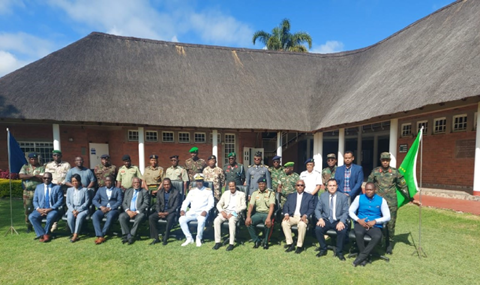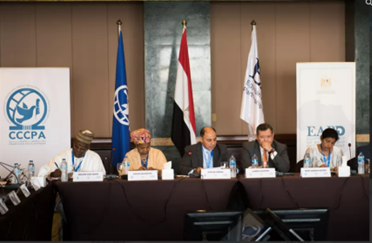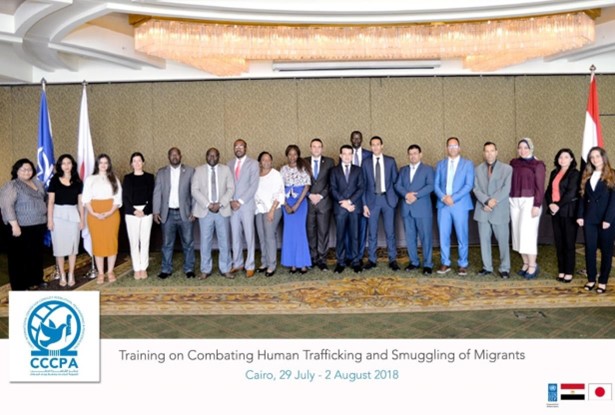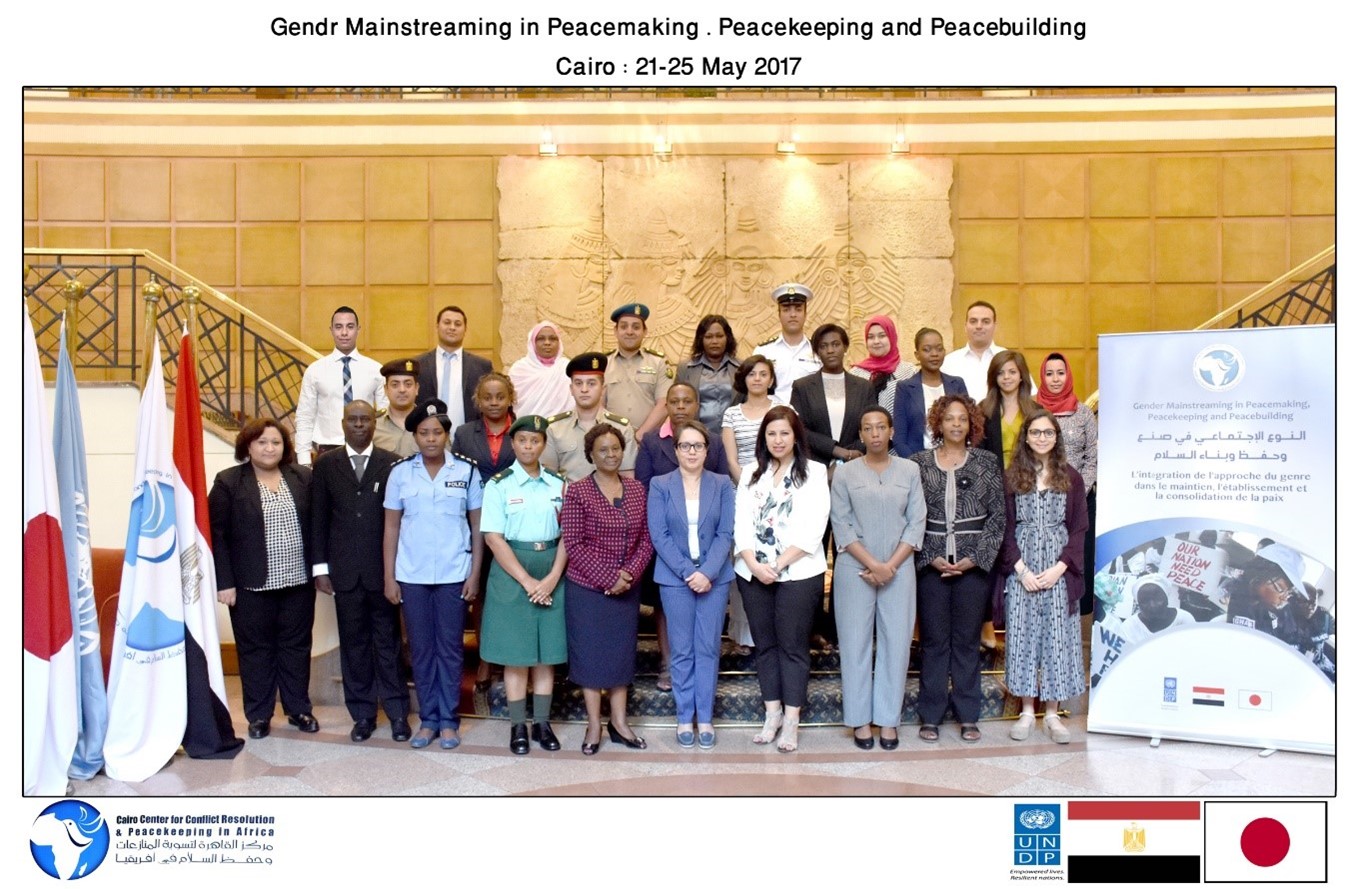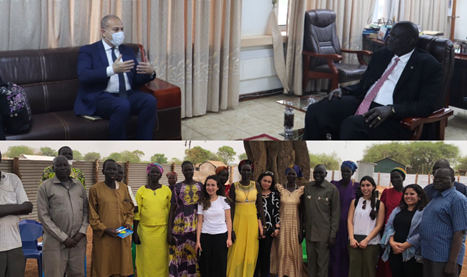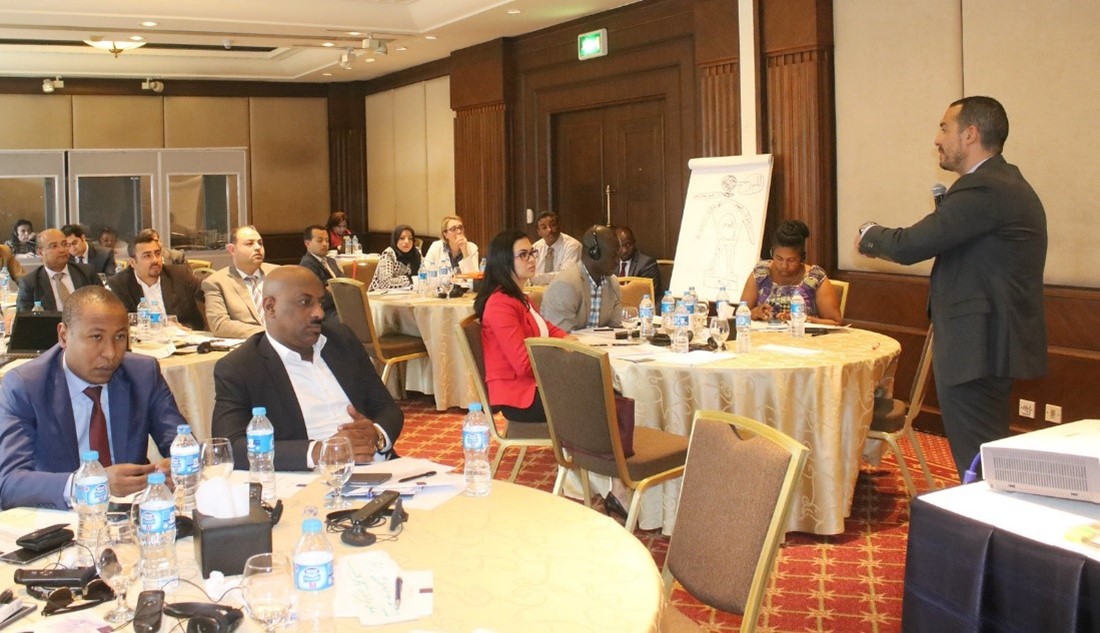 Enhancing Peace, Security and Stability in Africa
Enhancing capacities to prevent, manage and resolve conflicts, combat transnational threats and challenges to peace and security in Africa
Enhancing Peace, Security and Stability in Africa
Enhancing capacities to prevent, manage and resolve conflicts, combat transnational threats and challenges to peace and security in Africa

Challenges
A 2018 World Bank and United Nations report stated that due to the absence of concrete action, more than half of the people living in poverty in 2030 will be from countries affected by violent conflict. This could certainly apply to Africa. The continent has witnessed an unforeseen relapse into conflict in some countries and unanticipated tensions in others. Moreover, six of the ten countries that now account for more than 75 percent of the world's refugee population are in Africa. Armed conflict has become more protracted, complex and deadly, with civilians enduring most of the suffering. State fragility, a proliferation of non-state armed actors, and unconventional threats, such as climate disasters and disease epidemics, are among several challenges impeding and reversing human and economic development in the Arab and African regions.
Towards a Solution
In light of these challenges, and based on a comprehensive analysis of the evolving threat environment in Africa and the critical capacity gaps to prevent conflict and sustain peace, the international community is shifting its attention towards conflict prevention, focusing on addressing the root drivers of conflict, and creating the conditions for positive peace, earlier than warning signs are observed. UNDP and its partners provide resolute support to the Cairo International Centre for Conflict Resolution, Peacekeeping and Peacebuilding (CCCPA), an African centre of excellence for training and capacity-building to enhance African capacities to prevent, manage and resolve conflicts, and to combat transnational threats and challenges to African peace and security.
CCCPA aims to develop innovative approaches and critical capacities in four key areas linked to Enhancing African capacities in:
- Communities' resilience to radicalization and extremism, leading to terrorism
- Peacekeeping
- Conflict prevention and resolution
- Combating transnational threats and organized crime
CCCPA contributes to advancing the Sustainable Development Goals (SDGs) in Africa by facilitating international partnerships (SDG 17) necessary for the implementation of the proposed activities, contributing to promotion of peaceful, just and inclusive societies (SDG 16) in Africa through training workshops taking place where 46 participants from African countries were trained on peace-making, peacebuilding and sustaining peace, and 51 were trained on combating human trafficking and smuggling of migrants.
For example, the training programme “Preventing Radicalization and Extremism Leading to Terrorism” (PRELT) is the first of its kind in Africa. It seeks to empower local religious and community leaders and influencers to contribute to improving “community” resilience to radicalization and extremism leading to terrorism. The course provides trainees with the knowledge and skills to construct and deliver inclusive peace narratives, including those based on Sharia and Islamic teachings. In the words of a high-ranking Somali official, CCCPA trainings have “changed the thinking capacity of the Mogadishu Municipal staff on security and radicalization ideologies. They have shared the knowledge and experiences they have learned with the communities at large in Mogadishu City, as well as with the Municipal staff. The training outcome has made a real difference in our understanding of radicalization and extremism.”
Moreover, by streamlining gender in all the project's activities and advancing the implementation of the women, peace, and security agenda, it supports women's empowerment efforts (SDG 5) since 2014, where CCCPA, in cooperation with the Crisis Management Centre of Finland, the League of Arab States and the Arab Women Organization – delivered 18 foundational courses and 4 training of trainers courses. These courses serve as a contribution to mainstreaming gender across the continuum of peace interventions (conflict prevention and resolution, peace-making and peacebuilding), while establishing a group of experts and practitioners with enhanced knowledge and skills on the effective implementation of the Women, Peace and Security agenda.
CCCPA conducted number of workshops/conferences, training activities and publications throughout 2014-2022. In 2014, and in partnership with the United Nations Peacebuilding Support Office (UNPBSO), CCCPA organized the regional workshop, entitled “Regional Aspects of Peacebuilding: Identifying Gaps, Challenges and Opportunities”. The workshop’s outcome report was distributed as an official United Nations Security Council and General Assembly document.
Considering strengthening the cooperation between Egypt and South Sudan, the director general of CCCPA went to South Sudan on a field mission where they tackled ways to support peacebuilding efforts and cooperation to address the challenges facing South Sudan through the development of a comprehensive approach that enhances the humanitarian-development-peace nexus – an approach underpinned by the Aswan Forum for Sustainable Peace and Development. There was also positive feedback received from CCCPA alumni from South Sudan evaluating the impact of the trainings and workshops received.
Impact and sustainability are shown in the positive changes that were achieved as a result of the project, such as in the following examples: 1) Enhanced African capacities in areas of peace-making, peacekeeping, crisis management and combating human trafficking; and 2) Improved resilience of targeted local African communities in PRELT.
CCCPA adopts an inclusive and participatory approach to project design, implementation and evaluation, one that involves beneficiaries and stakeholders. Of particular significance is the latter’s contribution to the needs assessment phase, through extensive consultations and through identifying new and emerging needs in the field during implementation.
Furthermore, CCCPA adopts a sustainable approach. It will continue its efforts to diversify its sources of funding to ensure the financial sustainability of all its activities – either through the Egyptian Government or international partners. CCCPA's approach to training is one of building African long-standing capacities, as explained in its theory of change. This both ensures sustainability of results and provides opportunities for scaling up.
Contact Information
Countries involved
Supported by
Implementing Entities
Project Status
Project Period
URL of the practice
Primary SDG
Primary SDG Targets
Secondary SDGs
Secondary SDG Targets
Similar Solutions
| NAME OF SOLUTION | Countries | SDG | Project Status | |
|---|---|---|---|---|
A Billion Brains: Smarter Children, Healthier Economies High Level Meeting on South-South Cooperation for Child Rights |
Burkina Faso, Cameroon, Central African Republic, Chad, Democratic Republic of the Congo, Egypt, Ethiopia, Gabon, Kenya, Mali, Mozambique, Nigeria, Rwanda, Somalia, South Sudan, Zambia | 17 - Partnerships for the Goals | Completed | View Details |
Accelerating the Implementation of African Union Treaties in São Tomé and Príncipe South-South learning from the Beninese judicial system’s experience in the application of human rights treaties to its national law |
Burkina Faso, Cameroon, Central African Republic, Chad, Democratic Republic of the Congo, Egypt, Ethiopia, Gabon, Kenya, Mali, Mozambique, Nigeria, Rwanda, Somalia, South Sudan, Zambia | 05 - Gender Equality | Completed | View Details |
Accelerating the Transformational Shift to a Low-Carbon Economy in Mauritius Towards supplying 35 percent of the country’s energy needs with renewables by 2025 |
Burkina Faso, Cameroon, Central African Republic, Chad, Democratic Republic of the Congo, Egypt, Ethiopia, Gabon, Kenya, Mali, Mozambique, Nigeria, Rwanda, Somalia, South Sudan, Zambia | 05 - Gender Equality 09 - Industry, Innovation and Infrastructure 13 - Climate Action | Ongoing | View Details |
Accelerator Labs Network Following collective intelligence methods to address emerging sustainability challenges and the growing demand for local solutions |
Burkina Faso, Cameroon, Central African Republic, Chad, Democratic Republic of the Congo, Egypt, Ethiopia, Gabon, Kenya, Mali, Mozambique, Nigeria, Rwanda, Somalia, South Sudan, Zambia | 08 - Decent Work and Economic Growth 13 - Climate Action | Ongoing | View Details |
Accessibility of Financial Services and the Private Sector in Africa Maximizing the impact of financial cooperation on economic development and industrialization in Africa |
Burkina Faso, Cameroon, Central African Republic, Chad, Democratic Republic of the Congo, Egypt, Ethiopia, Gabon, Kenya, Mali, Mozambique, Nigeria, Rwanda, Somalia, South Sudan, Zambia | 08 - Decent Work and Economic Growth | Completed | View Details |
